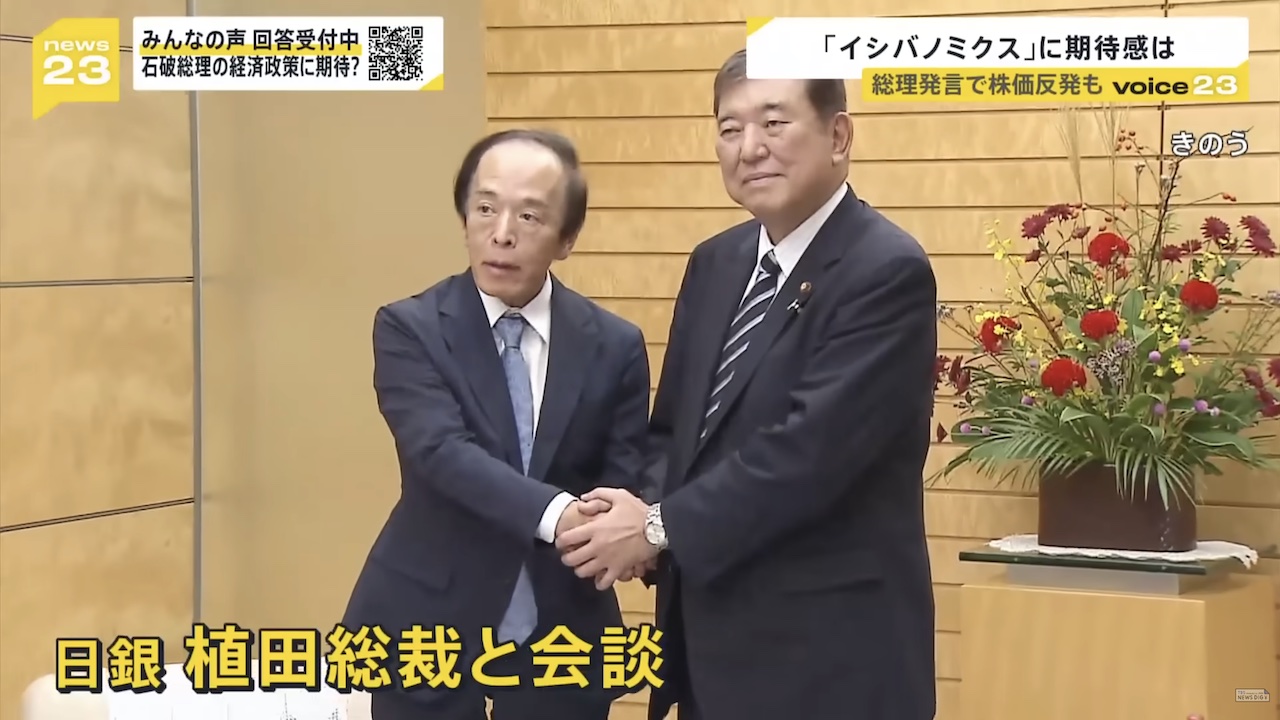TOKYO, Oct 04 (News On Japan) - Under Prime Minister Ishiba’s new economic policy, termed "Ishibanomics," what will happen to prices, wages, and ultimately, our daily lives? Ishiba's unusual remarks on interest rates have caused stock market volatility, leaving many to question the future direction of the government's economic policies.

Market insiders have been critical, labeling these shifts as a “complete turnaround.”
The economic policies of Ishibanomics, directly impacting our lives, remain uncertain. Concerns have arisen following Prime Minister Ishiba's statements, which have led to fluctuating stock prices, sparking fears about the future among market participants. Tonight, we invite you to share your thoughts via the QR code on the top left of the screen. Download the News Dig app to join the conversation.
The transition to the new administration also involved the handover to Junko Mihara, Minister for Child Policy, who caught the eye with her attire. While the new administration has largely retained many of the previous cabinet members, several officials took up new posts, hoping to drive the nation forward.
Prime Minister Ishiba recently met with Bank of Japan (BOJ) Governor Ueda. Following the meeting, Ishiba stated there is "no environment for additional rate hikes," which led to a sharp rebound in the Nikkei average, jumping by over 1,000 yen at one point. Additionally, Finance Minister Kato and Minister for Economic Revitalization Akasawa also held talks with Governor Ueda, hinting at the government's economic direction.
There is speculation within government circles that the upcoming elections are influencing policy directions. Amidst this, Prime Minister Ishiba’s economic policy, now dubbed "Ishibanomics," focuses on growth driven by wage hikes and investments.
In the capital, even a bathhouse operating since the Taisho era struggles with rising electricity and gas bills. The owner shared, “Although electricity and gas are convenient, they have become increasingly expensive." The government had previously introduced subsidies for utilities, but they are set to end this month. However, Minister Akasawa has hinted at extending these subsidies, signaling continued government intervention.
The public is questioning whether Ishibanomics will bring the desired economic changes. Many believe that an increase in the minimum wage is essential for economic improvement. However, raising the minimum wage to 1,500 yen would require overcoming several challenges, including addressing the 1.03 million yen income tax threshold. Teachers and other low-paid professionals are particularly hopeful for wage increases, given the prevalent criticism of low wages in these sectors.
Ishiba's stance on economic policy has left many market participants concerned. Although initially critical of Abenomics, advocating for the normalization of interest rates, his recent remarks appear to be backtracking, possibly in light of the approaching elections. This has led to market volatility and speculations of a "turnaround."
Public opinion is divided over Ishiba's economic policy. According to a recent survey, 34.3% of respondents expressed little to no expectation for his economic measures, while 26.2% indicated slight optimism. Key points of concern include ongoing inflation and wage growth, as Ishiba has already touched on these issues.
If the government proceeds with subsidies, it needs to outline how and when these measures will end. Since the introduction of utility subsidies, the government has spent around 11 trillion yen. The question remains: how far will this support go before fiscal constraints take precedence?
The government also aims to raise the average minimum wage to 1,500 yen by the 2020s. Currently, the minimum wage is 1,104 yen, which means achieving this goal would require a steady increase of about 8% annually over the next five years. However, even a 5% wage hike this year has strained many businesses, especially in the retail and restaurant sectors, making it questionable whether smaller businesses can sustain the targeted increases.
Source: TBS















